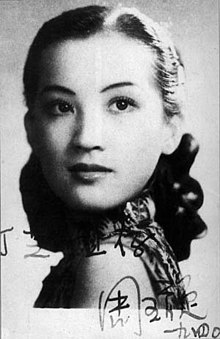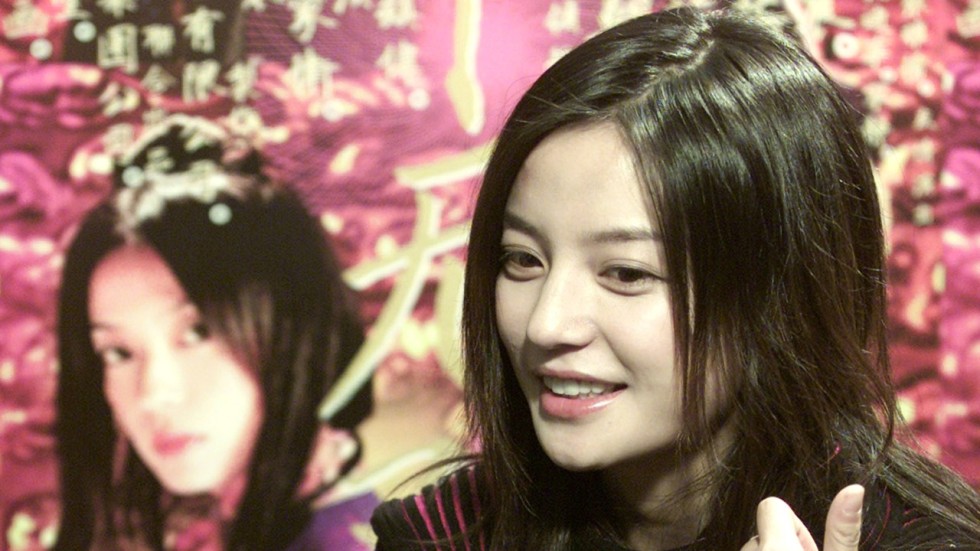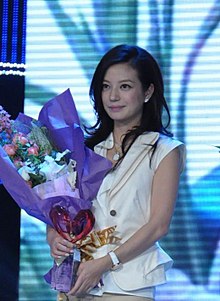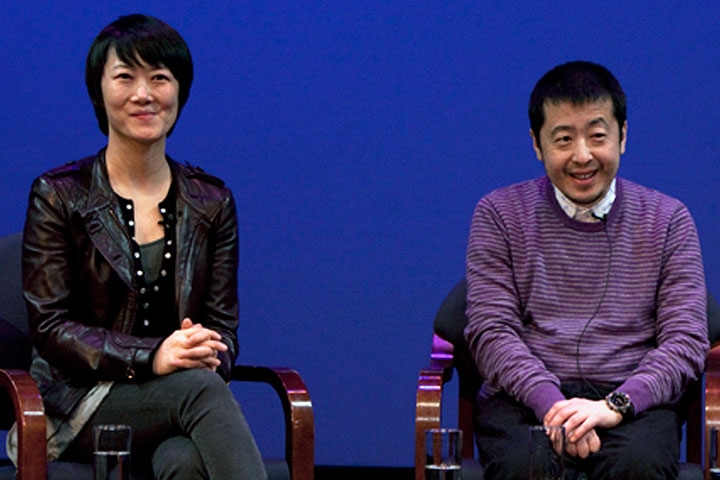source link (google.com.pk)
Zhao Wei (born 12 March 1976), also known as Vicky Zhao or Vicki Zhao, is a Chinese actress, film director, producer and pop singer. She is considered one of the most popular actresses in China and Chinese-speaking regions, and one of the highest paid actresses.[1][2] In 2015, Forbes described Zhao as the "world's wealthiest working actress".
While studying at the Beijing Film Academy, Zhao rose to national and regional prominence overnight for her role as Xiao Yanzi ("Little Swallow") in the hit TV series My Fair Princess (1998–1999), for which she also won Golden Eagle Award for Best Actress. My Fair Princess enjoyed unprecedented success in East and Southeast countries, and Zhao is regarded by many as Mainland China's first "national idol" since the economic reform began in 1978.
Over her 20 years acting career, Zhao has starred in many box-office smash-hits, including Shaolin Soccer (2001), Red Cliff (2008-2009), Painted Skin (2008), Painted Skin: The Resurrection (2012), Dearest (2014) and Lost in Hong Kong (2015). She has received numerous awards from the Shanghai International Film Festival, Huabiao Awards, Changchun Film Festival, Hundred Flowers Awards and Shanghai Film Critics Awards for films like A Time to Love (2005) and Mulan (2009). In 2014, after almost 2-year break from acting, she returned to the silver screen in Peter Chan's movie Dearest, and won the Hong Kong Film Critics Society Award and Hong Kong Film Award for Best Actress.
While focusing mostly on films, her works also include highly-popular TV series such as Romance in the Rain (2001), Moment in Peking (2005) and Tiger Mom (2015). She also began a singing career with her debut album Swallow (1999), and has since released 7 albums. In 2006, she won the MTV Asia Award for Favorite Artist from Mainland China, for her album Double.
Zhao received her master's degree of Film Directing from Beijing Film Academy in 2012. Her directorial debut So Young (2013) was both a huge box office and critical success. It broke the box office record for movies directed by female Chinese directors in just a week, and eventually became one of the highest-grossing films ever in China. The movie also earned her multiple awards in mainland China, Hong Kong and Taiwan, including Golden Rooster Award for Best Directorial Debut, Hundred Flowers Award for Best Director and Hong Kong Film Award for Best Film from Mainland and Taiwan.
In 2016, Zhao was named as member of the main Jury at the 73rd Venice International Film Festival.
In September 2017, she was named as a member of the main competition jury for the 30th Tokyo International Film Festival.
Early life
Born and brought up in Wuhu, Anhui, Zhao is the second child to Zhao Jiahai (Chinese: 赵家海; pinyin: Zhào Jiāhǎi), an engineer, and Wei Qiying (Chinese: 魏启颖; pinyin: Wèi Qǐyǐng), a primary school teacher,[4] She has an elder brother Zhao Jian (Chinese: 赵健; pinyin: Zhào Jiān; born 1971). After secondary school, Zhao entered Wuhu Normal School, a local education institution training students to become pre-school teachers. Apart from school, she also received training in piano, dance, and Chinese ink wash painting.
Early career (1994–1997)
In 1993, while Zhao was still in school, the movie A Soul Haunted by Painting (1994), directed by Huang Shuqin, starring Gong Li and Derek Yee, was filming in Wuhu. Zhao was cast for a cameo role, a young prostitute in the brothel where Gong's character works. This is her first acting experience. She appeared briefly at the beginning of the film and had no dialogue.[6][7]
Zhao had developed strong interests in acting after her first acting experience, and decided to become an actress. In 1994, after graduating from the Wuhu Normal School, she gave up her job as an apprentice pre-school teacher. She moved from her hometown to Shanghai and was enrolled in Xie Jin Star Academy, an acting school founded by the legendary Chinese director Xie Jin, where she received structured acting training during 1994 - 1995. She was also selected by Xie to star his movie Penitentiary Angel (1996). This was her first substantial role. Though she did not find her own performance fulfilling, Zhao considered it a valuable experience and a good start of her career. The film landed her other roles in TV series including her first leading role in Sisters in Beijing (1996). "I was too young to understand the role," she said, "but if you've been cast in a film by a famous director, no matter how well you did, other less-famous directors will also want to cast you."[1][7]
In 1996, Zhao was admitted to the School of Performing Arts, Beijing Film Academy (BFA) with the highest score national-wide. She graduated 4 years later with Bachelor Degree of Performing Arts from BFA as one of the most outstanding graduates - Zhao scored five "A"s and nine "A-"s out of the 14 courses. Her graduation thesis scored 90 (out of 100).
Rise to Stardom (1998–2002)
In 1997, renowned novelist and producer Chiung Yao was casting for the TV series My Fair Princess, a joint production by mainland China and Taiwan which was adapted from Chiung Yao's own novel. She identified Zhao Wei as a talent after watching Sisters in Beijing and offered Zhao the title role of Huan Zhu Ge Ge (Princess Pearl) a.k.a. Xiao Yanzi ("Little Swallow"), a rebellious and funny princess who dared to challenge authority and rules in the Palace. Filming the series was an arduous task for Zhao and her co-stars; Zhao herself acknowledged the intensity of filming:
We shot 18 to 20 hours a day. There were two groups of actors. One shot during the day, one at night. Frequently I'd have to do both. A few times I worked so hard that I actually threw up from the exertion. But I was young then. I didn't get tired easily. And I never complained about the working conditions. I thought that's just how it was supposed to be. Now I know that's wrong. But at the time I had no clue. Whatever they'd give me, I'd do. And as soon as I was done working I could just fall asleep. They'd say, 'Go to sleep,' and I'd go right to sleep.
The hard work of the cast yielded unexpected results. This comedic period drama quickly became a phenomenal sensation and swept TV ratings in Taiwan, mainland China, Hong Kong and Southeast Asian countries such as Singapore and Vietnam.[1] Zhao rose to prominence and became a household name overnight.[9] In 1999, she became the youngest actress to win the Golden Eagle Award for Best Actress.[7] She was regarded by many as mainland China's first "national idol", and was named one of Taiwan's "Top Ten Most Outstanding Individuals in Television Industry". She is also regarded as one of China's Four Dan Actresses.[10] However, alongside the phenomenal success were increasingly negative critics in mainland China, attacking the rebellious role as a "bad influence" over children and youngsters. During Chinese People's Political Consultative Conference 2002, a member of the CPPCC submit a proposal to calling to boycott the "little swallow".[11] Zhao once again worked with Chiung Yao for the 2001 television series Romance in the Rain, a costume drama based in the 1930s and 1940s. Opposite to the funny princess she played in My Fair Princess, Zhao played a vengeful girl who tried to exact revenge against her parents. The series was a commercial success, and recorded the highest ratings of the year.
Zhao soon felt that she had achieved all she could in television[inconsistent] and began to shift her career focus from TV to films.
Zhao went on to star a few Hong Kong movies. In 2001, she starred in the comedy film Shaolin Soccer alongside Hong Kong actor and director Stephen Chow. Zhao played an ugly-duckling steamed bun-maker-cum-taichi-master, a great contrast from the glamorous image she had established for herself in previous roles.[13] Zhao was nominated at the Chinese Film Media Award for Best Actress.[14] This was followed up by a supporting role in Chinese Odyssey 2002 as "Phoenix", for which she nominated Golden Horse Award for Best Supporting Actress.[15] In 2002, Zhao played an assassin in So Close, which also stars Shu Qi and Karen Mok.
Film (2003–2008)
In 2003, Zhao starred in four films: My Dream Girl, Warriors of Heaven and Earth, Green Tea, and Jade Goddess of Mercy. After much speculation over who was cast for the female lead An Xin in Ann Hui's film Jade Goddess of Mercy, the role was finally offered to Zhao, and her performance was well received by critics. In 2004, the Chinese Association of Film Performing Arts presented her the Golden Phoenix Award for this role.[17] She was also nominated at the 27th Hundred Flowers Award for Best Actress for her performance in Warriors of Heaven and Earth.
In 2004, Zhao was cast to dub the character Princess Fiona when Shrek 2 was released in China.[19]
The year 2005 proved to be another successful year for Zhao. She won the Golden Goblet Award for Best Actress at the Shanghai International Film Festival and tied with Zhang Ziyi for the Huabiao Award.[20][21] Both awards were for her performance in A Time to Love. Zhao once again won Best Actress for the film at the 8th Changchun Film Festival in 2006.
After a four-year break from television series, Zhao starred as Yao Mulan in a remake of Lin Yutang's Moment in Peking (2005). The television series became Zhao's fourth TV drama (after My Fair Princess, My Fair Princess 2 and Romance in the Rain) to become the highest rated drama of the year.[23] Zhao was nominated at the 26th Flying Apsaras Awards for Outstanding Actress.
Following the success of Moment in Peking, Zhao starred in The Postmodern Life of My Aunt, which premiered at film festivals around the world, including the Toronto International Film Festival.[25] Though Zhao only appeared ten minutes in the film, her performance led her to be nominated at the 43rd Golden Horse Awards and the 27th Hong Kong Film Awards for Best Supporting Actress.
In 2006, Zhao made a surprising move by sitting for the national entrance exam for postgraduate studies. After passing with flying colours, Zhao returned to her alma mater, the Beijing Film Academy (BFA) in September 2006 as a postgraduate student in the Department of Film Directing, where she studied under director Tian Zhuangzhuang. That year, Zhao was ranked No.4 on Forbes' 2006 China Celebrity 100 list.[28] She was also selected as the "Most Beautiful Woman" in China through a national voting by Sina.com & Sohu.com's users.[29] People magazine also listed Zhao as "100 Most Beautiful People" in 2006.
Zhao then portrayed a cabby in the 2007 film The Longest Night in Shanghai, starring alongside Masahiro Motoki and Dylan Kuo.[31] The same year, Zhao starred in the television series Thank You For Having Loved Me. She reportedly received a salary of 100,000 yuan per episode.
Gongfu epics (2008–2010)
From 2008 to 2009, Zhao starred in John Woo's historical epic Red Cliff.[32] Set in the Three Kingdoms period, the film was mainland China's most expensive production then.[33] She played Sun Shangxiang, the independent-minded sister of warlord Sun Quan, who disguises herself as a male enemy soldier to gather intelligence. Zhao received two nominations at the Hong Kong Film Award for Best Supporting Actress.
She next appeared in Gordon Chan's horror-adventure film Painted Skin (2008). The film set a new milestone in Chinese film by grossing 100 million yuan in six days.[34] Zhao's role as a general's wife was particularly acclaimed, and she received Best Actress nominations at the 27th Golden Rooster Award and 3rd Asian Film Award.[
In 2009, Zhao played the legendary character Hua Mulan in Jingle Ma's Mulan.[37] Jingle Ma called Zhao the "perfect fit" for the cross-dressing heroine.[38] Zhao won the Best Actress Award at the 10th Changchun Film Festival, 30th Hundred Flowers Awards and 19th Shanghai Film Critics Awards for her performance in the film.
On 6 August 2009, she was elected vice-president of China Film Performance Art Academy and executive member of the council of the China Environmental Society.
After filming the wuxia film 14 Blades alongside Donnie Yen,[43] Zhao took a 2-year break from acting in the middle of 2010. On 11 April 2010, she gave birth to a girl, Huang Xin, the only child of her and businessman Huang Youlong, whom she married in 2008.
In June 2010, she returned to limelight as a jury member of the 13th Shanghai International Film Festival.
Comeback and directing (2012-)
On 3 June 2015, Zhao Wei became the first ever Chinese actress to have left her hand-prints and footprints at the TCL Chinese Theatre in Hollywood.
Zhao returned from her extended parental leave in 2012, playing, incidentally, a single mother in Love, directed by Doze Niu. The film also achieved commercial success, and became the only film to gross 100 million yuan in both Taiwan and mainland China.[47] Critics call the solo performance of Zhao Wei as "the most amazing scene".[48] The same year she starred in Painted Skin: The Resurrection, the sequel to the 2008 film Painted Skin.[49] The film grossed over 700 million yuan to become the highest grossing Chinese film then, before being beaten by Lost in Thailand.
In 2012, she graduated from the directing institute of Beijing Film Academy, with an MFA dissertation defense score of 99/100, ranking #1 out of all the graduates.
Her directorial debut, So Young, opened on 26 April 2013 to 141 million yuan in its first weekend. She was the first female director whose debut film broke 100 million yuan in China.[52][53] In just one week, So Young garnered 350 million yuan,[54] with the final box office record in China being over 700 million yuan.[55] For the film, Zhao won the Golden Rooster Award for Best Directorial Debut, Hundred Flowers Award for Best Director and Hong Kong Film Award for Best Film from Mainland and Taiwan.
Production still. On 8 April 2016, director Zhao Wei (center) filming her second feature.
Zhao also became a judge for the 5th season of China's Got Talent alongside Liu Ye, Alec Su and Wang Wei Chun.
Zhao returned to acting in 2014, playing a countrywoman in the film Dearest,[59] directed by Peter Chan. The movie was selected by the 71st Venice International Film Festival in the Out-of-competition category, and Zhao's performance as a foster mother of illegally kidnapped children received international acclaim. The Hollywood Reporter called her Chinese Juliette Binoche.[60] This movie also earned Zhao the Hong Kong Film Award and Hong Kong Film Critics Society Award for Best Actress.
In 2015, she starred in comedies Hollywood Adventures and Lost in Hong Kong, both of which were commercially successful.[63][64] The same year, Zhao made her return to television in Tiger Mom.[65] She was nominated at the Asian Television Award and Magnolia Award for Best Actress.[66][67] On 20 October, Zhao elected as executive member of Executive Committee of China Film Directors' Guild.
In 2016, Zhao played a doctor in Johnnie To's crime thriller film Three.[69] She also began the production for her second directorial work No Other Love.[70] In July, she was named as a member of the main competition jury for the 73rd Venice International Film Festival.
In February 2017, Zhao went back to her alma mater - School of Performing Arts, Beijing Film Academy - to be the finale round examiner/assessor of applicants for the 2017 intake. The entrance exam is said to be the most challenging one of students pursuing performing arts whereby the success ratio is 1:113.[72] In September, she was named as a member of the main competition jury for the 30th Tokyo International Film Festival.
Personal life
Chinese actor Huang Xiaoming publicly acknowledged that he had crush over Zhao Wei when he and she both attended the Beijing Film Academy. Zhao rejected his courtship because she felt he was not mature enough. The two remain as close friends and have collaborated in the movie Hollywood Adventures, a joint Hollywood-Chinese production.
After two known relationships, Zhao Wei married Chinese businessman Huang Youlong in 2008 in Singapore. The couple's daughter, was born in April 2010.[citation needed]
Zhao is a well-known wine lover and has a passion for winemaking. On 21 December 2011, French newspaper Sud-Ouest reported that Zhao had bought Château Monlot, a Saint-Émilion Grand Cru, at 4 million euro. On 16 September 2012, Zhao Wei is admitted into the Jurade de Saint-Émilion. After 4 years of work, in October 2015, the winery launched the Bordeaux wine brand in the Chinese mass market. The online shop offers both high end and affordable wine selections.
Zhao Wei
Top 100 Most Chinese Actresses Beautiful Hot Hottest Sexiest Pics Wallpapers
Zhao Wei
Top 100 Most Chinese Actresses Beautiful Hot Hottest Sexiest Pics Wallpapers
Zhao Wei
Top 100 Most Chinese Actresses Beautiful Hot Hottest Sexiest Pics Wallpapers
Zhao Wei
Top 100 Most Chinese Actresses Beautiful Hot Hottest Sexiest Pics Wallpapers
Zhao Wei
Top 100 Most Chinese Actresses Beautiful Hot Hottest Sexiest Pics Wallpapers
Zhao Wei
Top 100 Most Chinese Actresses Beautiful Hot Hottest Sexiest Pics Wallpapers
Zhao Wei
Top 100 Most Chinese Actresses Beautiful Hot Hottest Sexiest Pics Wallpapers
Zhao Wei
Top 100 Most Chinese Actresses Beautiful Hot Hottest Sexiest Pics Wallpapers
Zhao Wei
Top 100 Most Chinese Actresses Beautiful Hot Hottest Sexiest Pics Wallpapers
Zhao Wei
Top 100 Most Chinese Actresses Beautiful Hot Hottest Sexiest Pics Wallpapers
Zhao Wei
Top 100 Most Chinese Actresses Beautiful Hot Hottest Sexiest Pics Wallpapers
















































